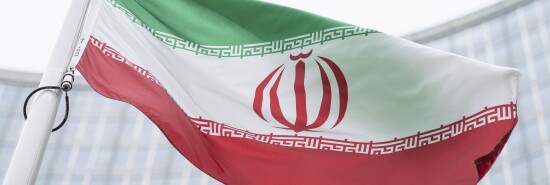
The bad and good news about Iran’s nuclear program
Daniel DePetris
Video Embed
The International Atomic Energy Agency, the world’s chief nuclear watchdog, leaked snippets of its latest quarterly report about Iran’s nuclear program last week. The picture is, at best, murky: good news wrapped in bad news, wrapped in confusion and ambivalence about the way ahead.
First, the bad news: Tehran remains extremely uncooperative with the IAEA’s investigations about its past nuclear work. Despite an agreement in March that sought to improve the nuclear agency’s ability to do its job, Iran has yet to implement fully what it signed onto. The IAEA has reinstalled some, but not all, of the cameras the Iranians previously ripped out in retaliation for U.S. sanctions. The information scooped up by those cameras is being kept by Tehran, which means the IAEA can’t even see the footage.
JUST SAY NO TO BAILING OUT BIDEN’S BORDER CRISIS
The investigations are stalled due to a lack of Iranian cooperation. IAEA staffers are having difficulty getting the required documentation to enter Iran, and Tehran’s stockpile of 60% enriched uranium continues to grow in the meantime. All of this led the IAEA to inform the board that “no progress” has been made in monitoring Iran’s nuclear activities.
Now, the good news: As uncooperative as the Iranians are, Tehran has nonetheless dialed back some technical aspects of its nuclear work. The Iranians aren’t adding many more advanced centrifuges. While Iran’s stock of 60% enriched uranium has grown, the increase was marginal compared to the previous quarter, slowing from 20 kilograms per month to 6.5. Some may view this decrease as irrelevant, but it does represent a faint degree of hope to U.S. officials who have spent years working on the Iran file, often with little to show for it.
Indeed, while the 2015 Iran nuclear deal is highly unlikely to be revived, Washington and Tehran are still keeping communication nodes open in an attempt to explore a more informal arrangement. Such an arrangement goes beyond Iran’s nuclear program, the core U.S. concern, and into other lanes, such as prisoner releases and U.S. sanctions enforcement on Iran’s oil industry. The term “grand bargain” would be a stretch, but it’s not entirely inaccurate.
Last month, after more than two years of talks, the U.S. and Iran agreed to a prisoner exchange deal that freed five wrongfully imprisoned Americans and unfroze $6 billion in Iranian oil revenue stuck in a South Korean bank. (The Biden administration insists it will have oversight over how Iranians spend the cash, although the Washington Examiner is extremely skeptical of such claims.)
There hasn’t been a single Iranian-sponsored attack against U.S. forces in Iraq or Syria since March, when an American contractor stationed in northeastern Syria was killed after Iranian-backed militias launched a drone attack on a U.S. base there. The Iranians are also selling more crude oil than earlier in the year; Bloomberg recently reported that U.S. officials privately confirmed that Washington has relaxed sanctions enforcement against Iranian barrels.
That last sentence is particularly infuriating to Iran hawks on Capitol Hill and across the constellation of think tanks in Washington, D.C. At first glance, it seems utterly odd, if not scandalous, for the U.S. to undermine its own sanctions programs. And yet what so many critics fail to recognize is that the so-called undermining is a deliberate policy choice meant to deescalate a situation that could easily turn hot. It’s a highly controversial move, no doubt, but one that could pay dividends if it compels Iranian proxies to stop taking potshots at U.S. forces and nudges Washington and Tehran toward a more comprehensive negotiation. The U.S., in other words, isn’t doing this out of the goodness of its heart; it’s doing it to entice the Iranians into acting more responsibly.
Don’t get me wrong: In an ideal world, none of this would be required. In an ideal world, the U.S. wouldn’t have to bribe Tehran with billions of dollars of its own money to get Americans out of Iran’s prison system. Ideally, Iran wouldn’t be arresting Americans on bogus espionage charges in the first place. Ideally, from Iran’s perspective, the U.S. would recognize that the Trump-era maximum pressure strategy was an abysmal failure and lift all of the economic sanctions as an act of contrition.
But guess what: We don’t live in an ideal world. In lieu of the impossible, the best we can do is tinker with our strategies in order to get results that are “good enough.” And as much as we may wish otherwise, “good enough” is the most we hope for when the U.S.-Iran relationship is concerned.
CLICK HERE TO READ MORE FROM THE WASHINGTON EXAMINER
Daniel DePetris (@DanDePetris) is a contributor to the Washington Examiner’s Beltway Confidential blog. His opinions are his own.
